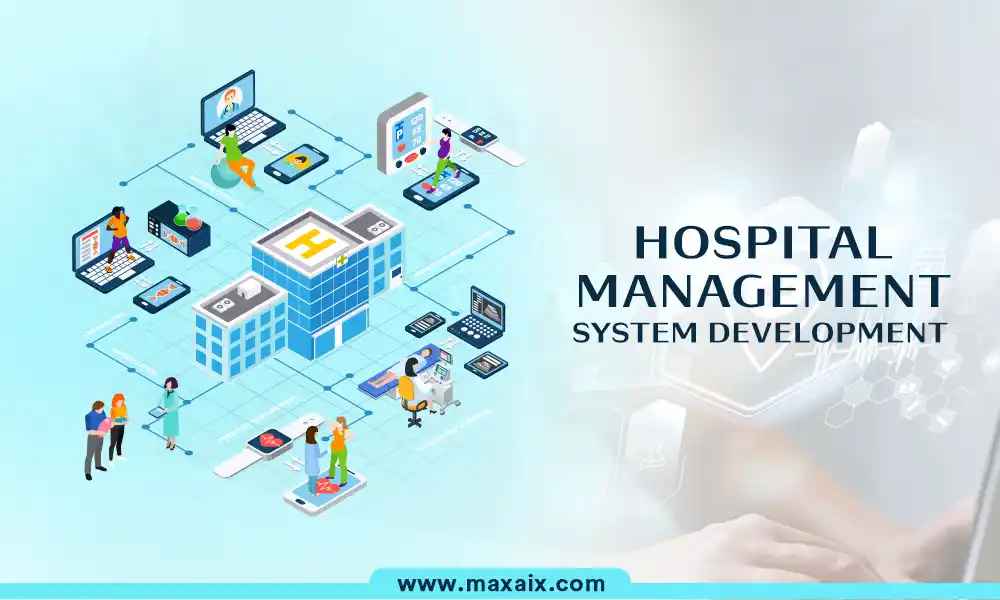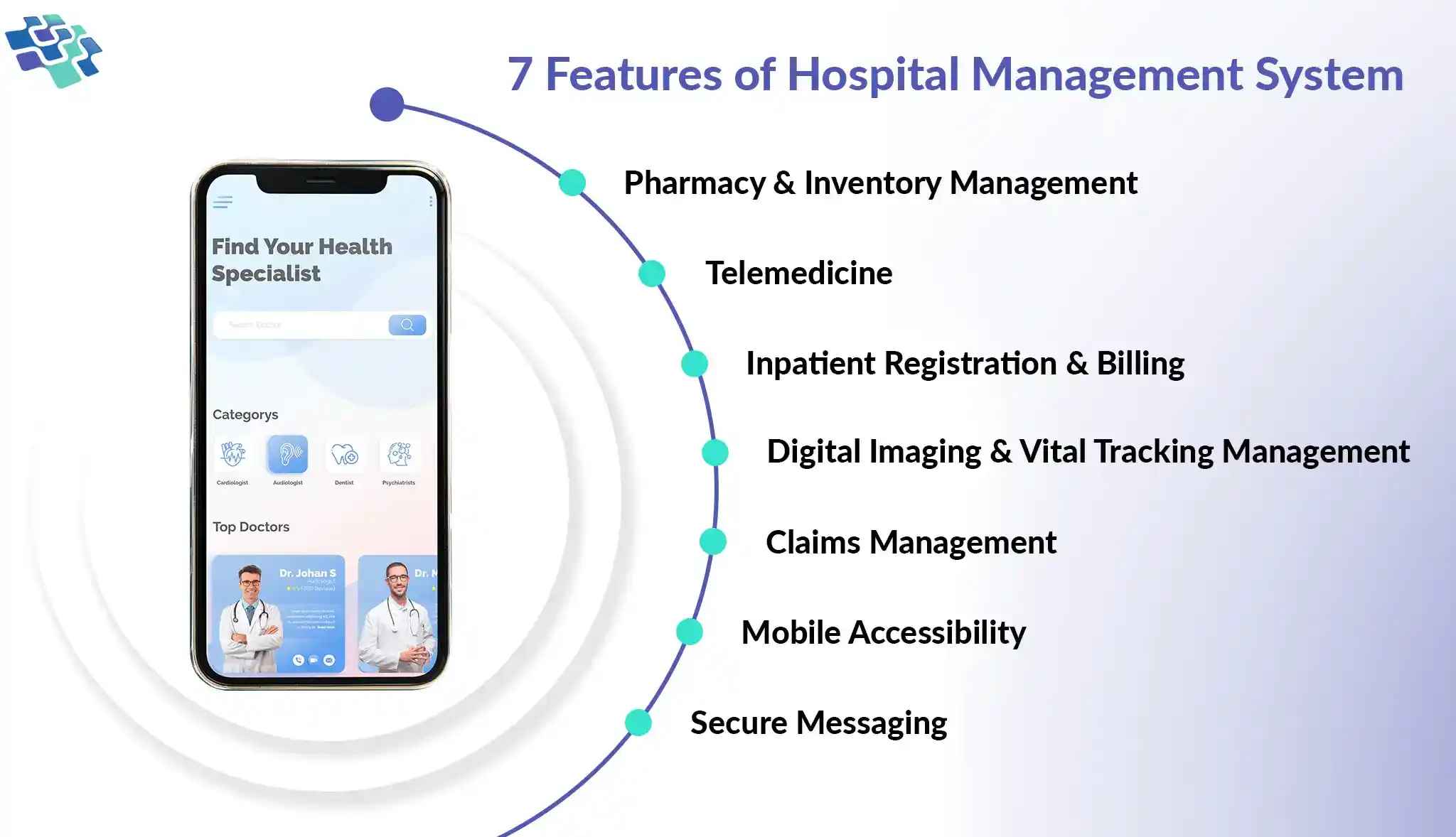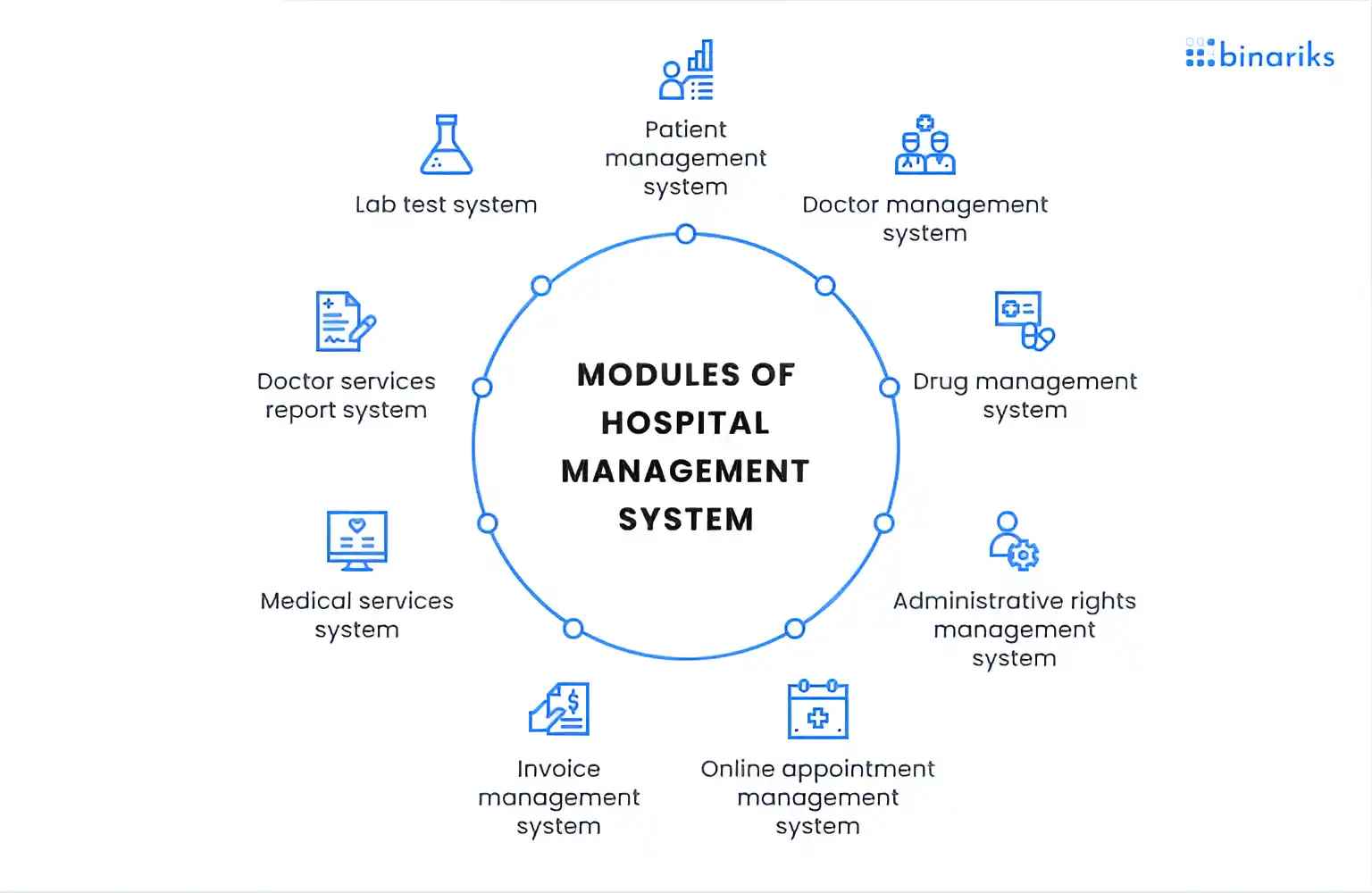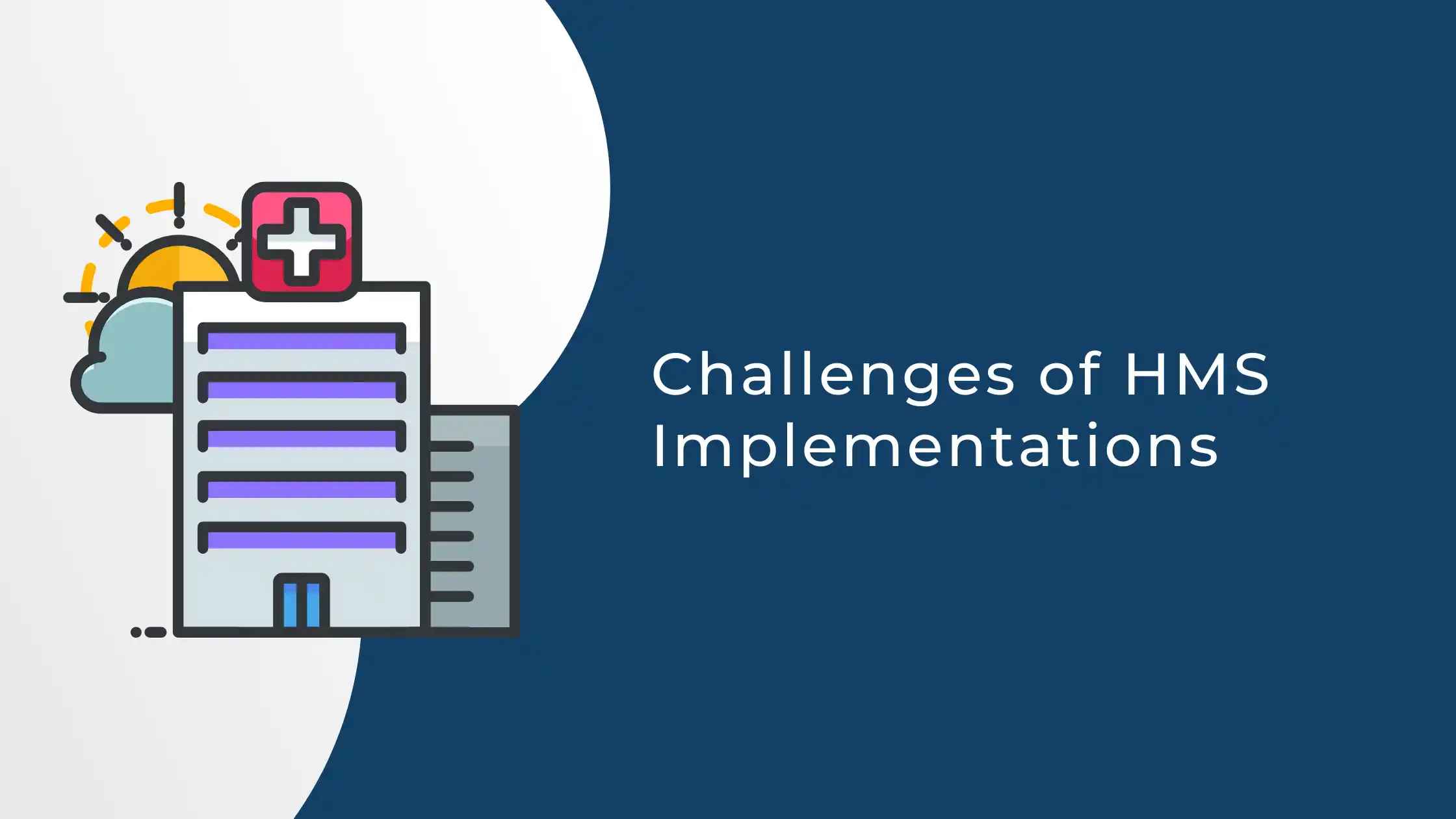Hospital Management System: Everything You Need to Know
Updated on : 06 March, 2025

Image Source: google.com
Table Of Contents
- 1. What is a Hospital Management System?
- 2. How Does a Hospital Management System Work?
- 3. Popular Benefits of Hospital Management System
- 4. Technology Used in Hospital Management System
- 5. What are the Different Hospital Management System Modules?
- 6. Features of a Hospital Management System
- 7. Challenges in Implementing a Hospital Management System
- 8. Emerging Trends in Hospital Management Systems
- 9. Hospital Management System: Top Four Types You Must Know
- 10. How Much Does a Hospital Management System Cost?
- 11. To Wrap Up
- 12. FAQs
Table Of Contents
Hospitals can manage patient information and various processes with feature-rich software systems. The hospital management system (HMS) is such software that provides a seamless approach to managing the operations of an entire hospital and improving patient experience. This blog sheds light on such HMS along with its benefits, types, features, modules, and other useful information. Keep reading to know more.
What is a Hospital Management System?
A Hospital Management System (HMS) is a software solution that enables medical staff to efficiently collect, store, retrieve, and securely share patient information across hospital departments. It streamlines the management of medical records, including radiology images, lab tests, blood reports, and pharmacy data, ensuring quick access for doctors, nurses, and technicians to improve patient care.
"Research shows that doctors spend nearly 49.2% of their time on paperwork, reducing efficiency and delaying treatment. An HMS automates administrative tasks, streamlining workflows and minimizing errors, allowing healthcare professionals to focus on patient care."
How Does a Hospital Management System Work?

Image Source: google.com
A Hospital Management System (HMS) functions as a centralized platform that automates and optimizes hospital workflows. It ensures smooth operations across different departments by integrating various processes, improving efficiency, and enhancing patient care.
Key Functions of HMS:
- Patient Management: Handles patient registration, appointments, admissions, and discharge processes efficiently.
- Electronic Medical Records (EMR): Stores, retrieves, and manages patient health records, including test results and prescriptions.
- Billing & Insurance Processing: Automates payment transactions, invoicing, and insurance claim management for faster processing.
- Staff & Workforce Management: Schedules doctors, nurses, and other hospital staff to ensure seamless operations.
- Inventory & Pharmacy Management: Tracks medical supplies, drugs, and equipment availability to prevent shortages.
- Real-time Data Access: Provides instant access to patient records, test reports, and treatment histories, improving decision-making.
- Interdepartmental Coordination: Enhances communication between different hospital units, reducing errors and delays.
- Security & Compliance: Ensures data privacy and compliance with healthcare regulations such as HIPAA and GDPR.
Popular Benefits of Hospital Management System
A Hospital Management System (HMS) enhances efficiency, security, and patient care by automating key hospital operations. Below are the major benefits:
- Improved Patient Care: Streamlines patient registration, appointments, and treatment processes, ensuring timely and accurate care.
- Efficient Administration: Reduces paperwork, automates workflows, and optimizes hospital operations for better management.
- Data Security & Compliance: Ensures secure storage of medical records and patient data while maintaining compliance with healthcare regulations.
- Cost Reduction: Optimizes resource allocation, minimizes administrative overhead, and reduces operational expenses.
- Better Revenue Management: Enhances billing accuracy, speeds up insurance claim processing, and improves financial tracking.
Technology Used in Hospital Management System

Looking for expert guidance on Hospital Management Systems?
Hospital Management Systems (HMS) utilize various advanced technologies to ensure seamless operation, data security, and interoperability within healthcare facilities. Key technologies include:
| Category | Technologies | Purpose |
|---|---|---|
| Programming Languages | Java, Python, PHP, C# | Develop core functionalities and system architecture. |
| Databases | MySQL, PostgreSQL, Oracle, MongoDB | Store and manage patient records, billing, and hospital data. |
| Frameworks | Django, Laravel, .NET, Spring Boot | Provide structured development and enhance scalability. |
| Cloud Services | AWS, Microsoft Azure, Google Cloud | Enable remote access, scalability, and secure data storage. |
| Security Protocols | HIPAA Compliance, SSL Encryption, Data Encryption | Ensure data security, privacy, and regulatory compliance. |
| Integration APIs | HL7, FHIR | Enable interoperability with other healthcare systems. |
These technologies work together to create a robust, efficient, and secure system that enhances hospital management and patient care.
What are the Different Hospital Management System Modules?

Image Source: google.com
A Hospital Management System (HMS) is composed of various modules that streamline hospital operations and enhance patient care. Key modules include:
| Module | Function |
|---|---|
| Patient Management | Handles admission, discharge, and transfers. |
| Appointment Scheduling | Manages doctor availability and patient bookings. |
| EMR (Electronic Medical Records) | Stores and retrieves patient health data. |
| Billing & Invoicing | Automates payments and insurance claims. |
| Pharmacy Management | Tracks drug inventory and prescriptions. |
| Lab & Diagnostics | Manages test scheduling and report generation. |
| Staff & Payroll | Handles employee records and payroll. |
| Inventory Management | Ensures medical supply availability. |
| Reports & Analytics | Provides hospital performance insights. |
Features of a Hospital Management System
Key Features:
-
User-Friendly Interface – The system is designed for easy navigation, allowing hospital staff and administrators to use it without technical difficulties.
-
Role-Based Access Control – Ensures that only authorized personnel can access specific data, maintaining patient privacy and security.
-
Automated Workflow – Reduces paperwork and manual tasks by automating hospital processes, making operations more efficient.
-
Mobile Compatibility – Allows doctors and staff to access important information from smartphones or tablets, improving flexibility.
-
Multi-Language Support – Supports multiple languages to ensure usability for diverse staff and patients across different regions.
-
Telemedicine Integration – Enables remote consultations, allowing doctors to diagnose and monitor patients without needing in-person visits.
-
AI & Machine Learning – Uses advanced technologies to assist in diagnosing diseases, predicting patient conditions, and improving treatment accuracy.
Optimize your business with AI-driven IoT, cloud services, predictive analytics, and voice recognition for smarter decision-making.
Challenges in Implementing a Hospital Management System

Image Source: google.com
-
Resistance to Change – Hospital staff may be reluctant to switch from traditional methods to a digital system, requiring proper training and support.
-
Data Migration Issues – Moving patient records from paper-based or outdated systems to a new HMS can be complex and time-consuming.
-
Cost & Maintenance – Implementing and maintaining the system involves significant costs for software, hardware, updates, and technical support.
-
Security Concerns – Ensuring data protection and compliance with healthcare regulations like HIPAA and GDPR is essential to prevent breaches and unauthorized access.
Enhance efficiency with IoT solutions, enabling smart connectivity, real-time monitoring, and data-driven automation for better decision-making.
Emerging Trends in Hospital Management Systems

Looking to Integrate Blockchain Solutions into Your Business?
-
AI & Machine Learning – Helps predict patient conditions, improve diagnostics, and personalize treatment plans through data analysis.
-
Blockchain – Enhances security and transparency in medical records by preventing unauthorized access and ensuring data integrity.
-
IoT Integration – Uses smart devices to monitor patient health in real time, enabling better tracking of vitals and early detection of health issues.
-
Telemedicine & Remote Care – Allows doctors to conduct virtual consultations and monitor patients remotely, improving access to healthcare.
-
Augmented Reality (AR) & Virtual Reality (VR) – Assists in medical training, surgical simulations, and enhanced patient education for better treatment outcomes.
Blockchain Development Service:
Hexadecimal Software's blockchain solutions enhance fintech security, transparency, and trust in transactions.
Hospital Management System: Top Four Types You Must Know
| Type | Description |
|---|---|
| Cloud-Based HMS | Hosted on cloud servers, accessible from anywhere, offering scalability and cost-effectiveness. |
| On-Premise HMS | Installed on hospital-owned servers, providing full control over data and security, ideal for compliance-focused hospitals. |
| Open-Source HMS | Customizable software with community support, allowing hospitals to modify features as needed at a lower cost. |
| Enterprise HMS | Designed for large, multi-specialty hospitals and healthcare chains, integrating multiple departments for seamless management. |
How Much Does a Hospital Management System Cost?
| Hospital Size | Cost (USD) | Cost (INR) (Approx.) |
|---|---|---|
| Small Clinics | $5,000 – $20,000 | ₹4,15,000 – ₹16,60,000 |
| Medium Hospitals | $20,000 – $100,000 | ₹16,60,000 – ₹83,00,000 |
| Large Healthcare Institutions | $100,000 – $500,000+ | ₹83,00,000 – ₹4,15,00,000+ |
Note: Conversion is based on $1 = ₹83 (approx.) and may vary. Additional costs include licensing, customization, training, and maintenance.
To Wrap Up
A Hospital Management System is vital for modern healthcare facilities, enhancing efficiency, patient care, and financial management. Choosing the right HMS can improve healthcare outcomes, streamline operations, and reduce costs. It is essential to consider factors like scalability, security, and integration capabilities to ensure seamless hospital management.
FAQs
Q1: What is a Hospital Management System (HMS)?
A: A digital solution that automates hospital operations like patient care, billing, and records management.
Q2: How does an HMS improve patient care?
A: It streamlines processes, ensures quick access to medical records, and enhances coordination among departments.
Q3: Can HMS reduce hospital operational costs?
A: Yes, it optimizes resource allocation, reduces paperwork, and automates workflows, lowering expenses.
Q4: What are the key technologies used in HMS?
A: Technologies include Java, Python, MySQL, PostgreSQL, AWS, HIPAA compliance, and HL7/FHIR integration.
Q5: What are the main types of HMS?
A: Cloud-based, on-premise, open-source, and enterprise HMS, each catering to different hospital needs.
Q6: Is HMS suitable for small clinics?
A: Yes, tailored solutions with essential features like appointment scheduling and billing are available.
Q7: How long does it take to implement an HMS?
A: It varies from a few weeks to months, depending on hospital size and customization.
Q8: Is an HMS secure and compliant with regulations?
A: Most HMS follow HIPAA and GDPR compliance, ensuring data security and patient privacy.
Q9: What are the emerging trends in HMS?
A: AI, blockchain, IoT integration, telemedicine, and AR/VR are shaping the future of hospital management.
Q10: How much does an HMS cost?
A: Costs range from $5,000 for small clinics to over $500,000 for large hospitals, depending on features and customization.


